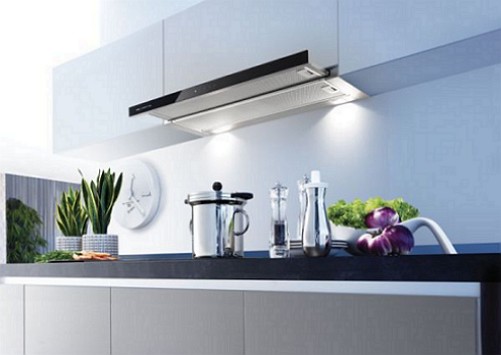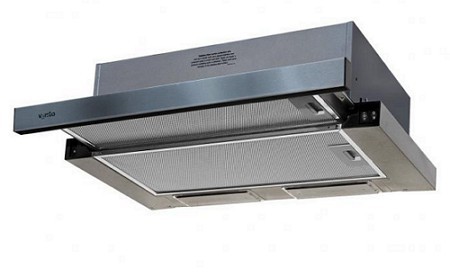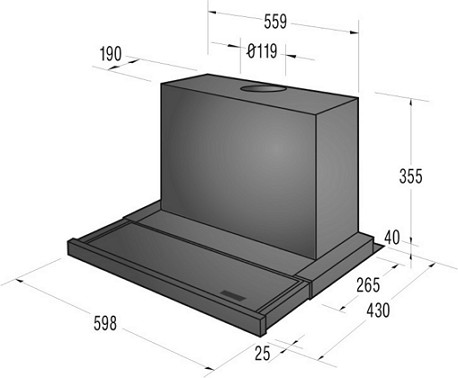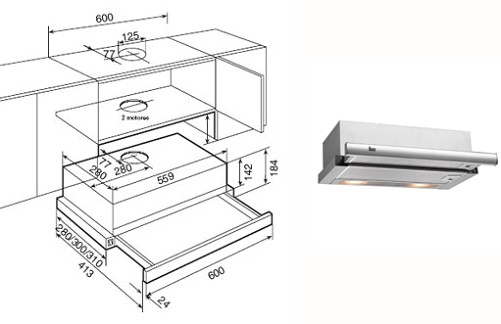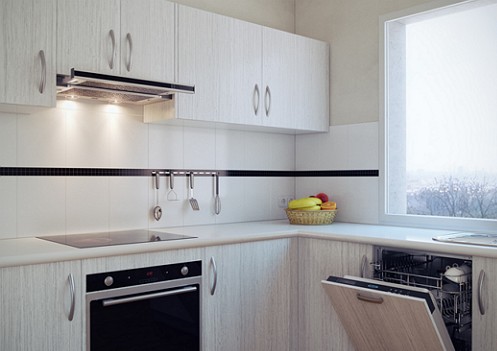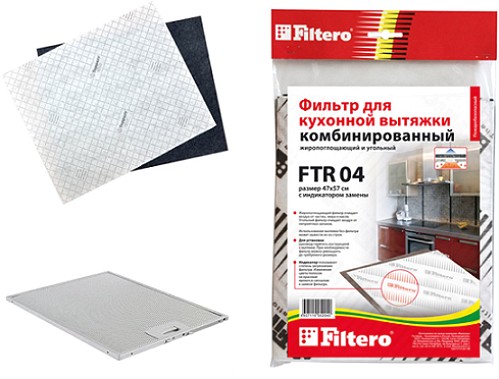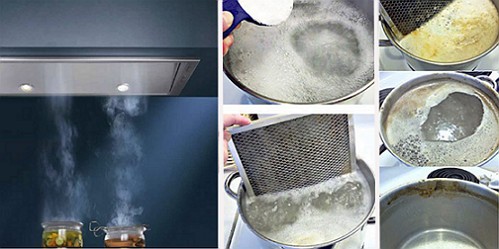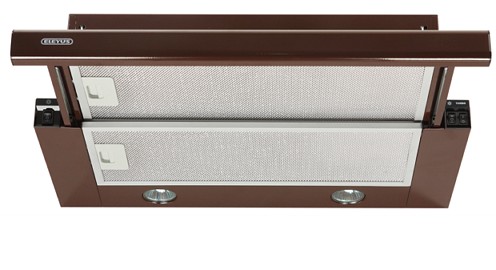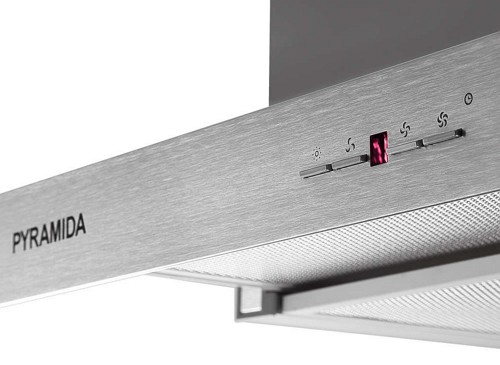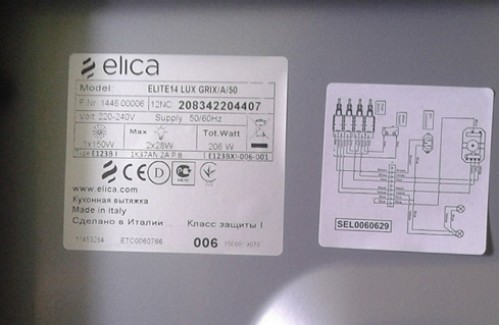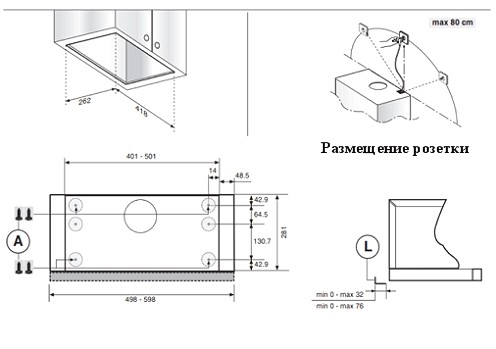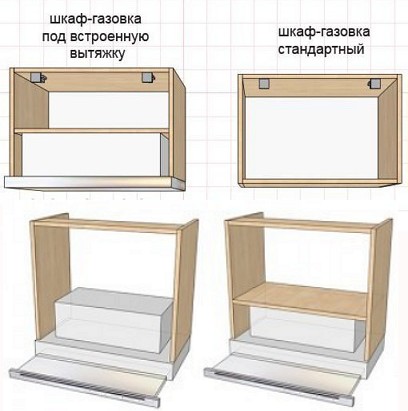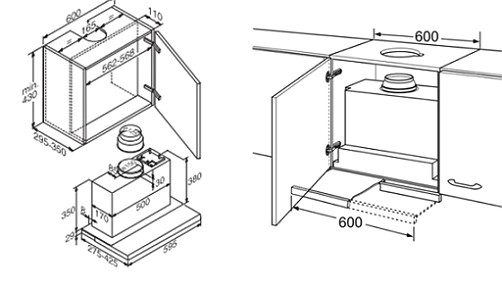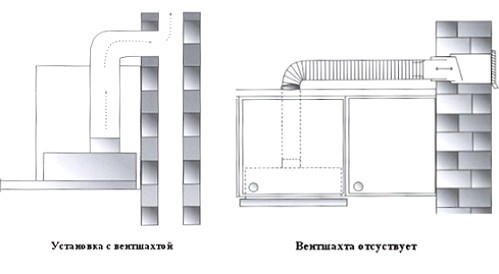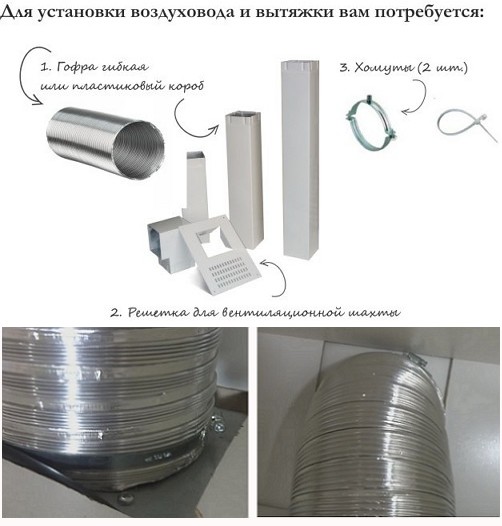Large-sized cousins of kitchen hoods gradually give way to a compact telescopic. At the heart of the successful competition of telescopic hoods is the ease of placement and installation of the unit in a hanging cabinet. Naturally, for this it is necessary to select and install the hood. How to do it with our own hands will help our advice.
Content
We choose a telescopic hood
Built-in kitchen furniture today is in demand, thanks to a successful opportunity to give the room a stylish appearance. In addition, the best option for placing ventilation in the kitchen is the possibility of placing the telescopic hood.
Even for a small amount of room space, kitchen hoods can provide good air quality. What are the advantages of telescoping in comparison with other models of home appliances? Just what rushes, or rather does not catch your eye, is the compact dimensions of the hood: the width is from 500 to 900 mm, allowing you to fit the technique into the interior design of any modern kitchen.
When choosing an aggregate, it must be remembered that the width is selected from the width of the cooking surface of the plate.
Traditionally built-in hoods are placed in a hanging cupboard directly above the stove. The original appearance of the front carriage bar reliably hides the mechanism and filters of the hood from the eyes. On what parameters it is recommended to choose built-in models to buy a telescopic hood.
Which hood is better, technical specifications
The main parameters for choosing a hood are:
• unit capacity
• power and operation modes
• type of air purification filter
• type of management.
output efficiency
The productivity of the hood means a quantitative index, namely the ability of the unit to perform air exchange in a given unit of time.
According to the regulatory documents required for the ventilation of living quarters, air exchange in the kitchen is recommended to be arranged approximately 10 times per hour for the exchange of air. Therefore, before choosing a hood unit, perform a simple calculation of the unit's capacity, regardless of the location of the hood in a private house or apartment.
Naturally, the price of telescopic drawing depends on the capacity and capacity of the unit.
It is better to give preference to the models on the leaving carriage with a grease trap. For example, these are Bosch hoods DHL 545 S or Elica KREA GFA WH / F / 60.
unit power and operation modes of the hood
The power output is indicated by the number of motors and operating modes. Recall that the telescopic hood for the kitchen can not be an analogue of the ventilation system for the purpose of the unit. The main purpose of the hood is to clean the room air from soot and cooking odors.
Models of hoods operate in 2 modes: air extraction and recirculation.
type of exhaust filters
Any hood is equipped with filters. It is necessary to distinguish filters for coarse and fine cleaning of the hood. The coarse filter (grease collector) is able to hold droplets of grease and soot.
For extracts use such grease filters:
• Acrylic
• from organic (sintepon)
• paper non-woven
• cassette-type metal filters.
Acrylic and non-woven filters are considered disposable. The resource of using the filter depends on the intensity of the flow and the contamination of the room air.
Metal filters can be washed as they are contaminated, so their service life is longer.
control buttons for hoods
The body of the telescoping hood, after proper installation, will be placed inside the hinged module. For use, there is only a narrow front panel. The extension of the filters to remove the combustion products of the gas is carried out on a telescopic principle. Extending, the panel with the filter, includes the fan motor and illumination.
To remove the exhaust air flow on vertical and horizontal planes there are plastic adapters with holes. On the panel or on the hood, there are buttons or control keys: power adjustment and mode selection.
In addition, models can have these control buttons:
• Automatic performance increase
• Fan residual function
• the filter status indicator.
Naturally, in addition to the listed technical parameters, the overall dimensions of the hood and the possibility of its own connection are important.
Installing the hood in the kitchen, how to connect the telescopic hood
installation of euro electrical outlet
The hood is a household electrical appliance. Therefore before installation it is necessary to conduct a euro electrical outlet with grounding. The unit is supplied with a voltage of 220V. The power of the hood will be indicated on the technical data sheet.
The only prerequisite for connection is not the sagging of the electrical wire above the hob.
The regulatory document for installation and connection of the extractor are SNiP 41-01-2003 "Heating, ventilation and air conditioning" and installation instructions from the manufacturer.
It must be remembered that after installing the hood and securing the housing, its movable part must move freely. The built-in part from the fixing point of the air duct is not fastened securely, but is connected with a clamp.
assembly assembly
To accommodate the hood, a frame is required, capable of supporting a weight of about 10 kg. It can be a cabinet of built-in furniture with additional reconstruction. Prepare the locker for fixing the elements of the hood - remove the bottom of the locker. Installing the hood is recommended to be done by attaching the back of the unit and the body to the wall.
To do this, cut out the landing nest according to the mounting dimensions of the hood, taking into account the allowances, and if necessary, change the lid and shelf of the casing. Before assembling the frame in the upper panel of the cabinet, drill a hole to install the air duct.
duct installation
To operate the hood, an air duct is required. The diameter of the air duct in models of telescopic exhaust units can reach 123-150 mm. The exhaust outlet of the hood can be connected to the ventilation shaft, and in the absence of it with an opening in the wall.
Models of telescopic hoods are equipped in the upper part with a special branch pipe, the diameter of which is specified in the equipment specification.
To install the duct, round or rectangular corrugation can be used. Installation is made in the traditional way.
How to connect the corrugation to the hood and flange of the duct, shown in the video.



